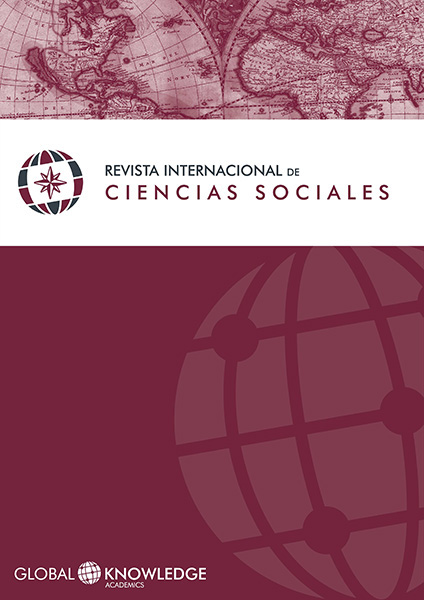Gender Perspective: an Epistemic Construction
DOI:
https://doi.org/10.37467/gka-revsocial.v4.786Keywords:
Gender, Epistemic Thought, Gender PerspectiveAbstract
This article presents a proposal to approach the topic on gender as an holistic confluence apprehended through epistemic thought, which differs from the schematic conception presented by theory. Thus, the object of study is transformed into an “appeal for objectivity” (Zemelman, 1992, p.57), whereas criticism and self-criticism play a leading role in the discovery of different ways of thought, more than in the findings of new facts. This appeal for objectivity is achieved by a series of case studies (Stake, 2010), with the assumption of gender perspective as the ultimate goal, allowing to build a knowledge relationship that begins as the questions arise when theorizing about the reality of gender.
Downloads
Global Statistics ℹ️
|
662
Views
|
337
Downloads
|
|
999
Total
|
|
References
Burin, M. (1994). Género y Psicoanálisis: Subjetividades femeninas vulnerables. Espacios Temáticos: Psicoanálisis, estudios feministas y género. Recuperado de: www.psiconet.com.foros/genero/subjetividad.htm
Burin, M. y Meler, I. (2000). Varones. Género y subjetividad masculina. Buenos Aires: Paidós.
Burin, M., Jiménez Guzmán, M.L. y Meler, I. (Comps.) (2007). Precariedad laboral y crisis de la masculinidad. Impacto sobre las relaciones de género. Buenos Aires: Universidad de Ciencias Empresariales y Sociales.
Cánovas, C. (2004). Tejedoras de sí mismas. Algo más sobre género, innovación y docencia. México: Universidad Autónoma de Aguascalientes.
Castoriadis, C. (2004). Sujeto y verdad en el mundo histórico-social. Buenos Aires: Fondo de Cultura Económica.
Castoriadis, C. (2006). Figuras de lo pensable . México: Fondo de Cultura Económica.
Corominas, J. (1973). Breve Diccionario Etimológico de la Lengua Castellana. Barcelona: Ed. Gredos.
De la Garza, E. (1988). El positivismo: polémica y crisis. En Hacia una metodología de la reconstrucción. México: UNAM-Ed. Porrúa.
Foucault, M. (2007). Las palabras y las cosas. México: Fondo de Cultura Económica.
Izquierdo, M. (2002). ¿En qué consiste la masculinidad? De lo privado a lo público, de lo personal a lo relacional, de lo psíquico a lo social. En Reunión de Masculinidad y Políticas Públicas. México: PUEG-UNAM, del 25 al 27 de noviembre.
Jiménez Guzmán, M.L. (2007). Algunas ideas de la construcción social de la masculinidades y las feminidades, el mundo público y el mundo privado. En Reflexiones sobre masculinidad y empleo (pp. 99-118). Cuernavaca-Morelos: Centro Regional de Investigaciones Multidisciplinarias.
Lagarde, M. (1996). La perspectiva de género. En Género y feminismo. Desarrollo humano y democracia (pp. 13-38). España: Ed. Horas y Horas.
Lagarde, M. (2002). Antropología, feminismo y política: Violencia Feminicida y Derechos Humanos de las Mujeres. En M. Bullen y M. Diez (Coord.), Retos teóricos y nuevas prácticas. Barcelona: Ed. Anagrama.
Lamas, M. (1999). Usos, dificultades y posibilidades de la categoría género, en Papeles de Población. México: Universidad Autónoma del Estado de México.
Lamas, M. (2002). Cuerpo: diferencia sexual y género. México: Taurus.
Lamas, M. (2011). La perspectiva de género. Revista de Educación y Cultura , pp. 1-8.
Meler, I. (2007). Subjetividad y trabajo en la crisis de la modernidad. En Reflexiones sobre masculinidad y empleo (pp. 275-293). Cuernavaca-Morelos: Centro Regional de Investigaciones Multidisciplinarias.
Meler, I. (2012). Las relaciones de género: Su impacto en la salud mental de mujeres y varones. En C. Hazaki (Compilador), La crisis del patriarcado (pp. 23-46). Buenos Aires: Ed. Topía.
Real Academia Española. (1992). Diccionario de la Lengua Española. Madrid: R.A.E.- Mateu Cromo, Artes Gráficas.
Sartre, J.P. (2004). El ser y la nada. España: Losada.
Scott, J. (1986). Gender as a Useful Category of Historical Analysis. American Historical Review, 91, pp. 1053-1075. DOI: https://doi.org/10.2307/1864376
Scheler, M. (2012). El puesto del hombre en el cosmos. España: Losada.
Stake, R. (2010). Multiple Case Study Analysis. New York: Guilford Press.
Zemelman, H. (1992). Los horizontes de la razón. Uso crítico de la teoría. México: El Colegio de México- Anthropos.
Zemelman, H. (2012). Pensar teórico y pensar epsitémico: Retos de la ciencias sociales latinoamericanas. Enseñar a pensar. Instituto Pensamiento y Cultura en América A.C. (IPECAL).
Downloads
Published
How to Cite
Issue
Section
License
Those authors who publish in this journal accept the following terms:
-
Authors retain copyright.
-
Authors transfer to the journal the right of first publication. The journal also owns the publishing rights.
-
All published contents are governed by an Attribution-NoDerivatives 4.0 International License.
Access the informative version and legal text of the license. By virtue of this, third parties are allowed to use what is published as long as they mention the authorship of the work and the first publication in this journal. If you transform the material, you may not distribute the modified work. -
Authors may make other independent and additional contractual arrangements for non-exclusive distribution of the version of the article published in this journal (e.g., inclusion in an institutional repository or publication in a book) as long as they clearly indicate that the work was first published in this journal.
- Authors are allowed and recommended to publish their work on the Internet (for example on institutional and personal websites), following the publication of, and referencing the journal, as this could lead to constructive exchanges and a more extensive and quick circulation of published works (see The Effect of Open Access).













